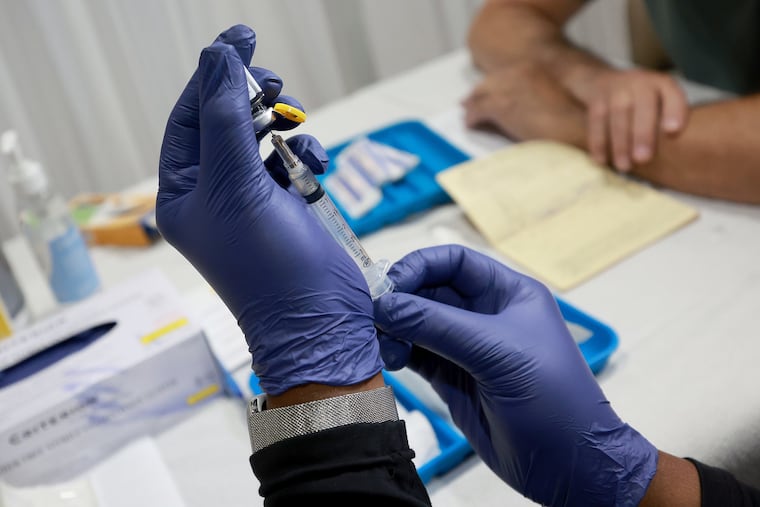Pa. receives first major shipment of monkeypox vaccine, with half of the 450 doses going to Philly
In Philadelphia, access to the vaccine for now will be limited to people who have been exposed to monkeypox.

The first major shipments of monkeypox vaccines have arrived in Philadelphia and Pennsylvania, public health officials said Wednesday, but it may not be enough to contain the spreading virus.
Philadelphia received half of the 450 doses of the vaccine JYNNEOS allocated to Pennsylvania by the U.S. Department of Health and Human Services.
New Jersey has been allocated a total of 2,813 doses, according to HHS. Nationally, 135,000 doses of the vaccine have been shipped.
Monkeypox cases are rising, although the disease remains rare. As of Wednesday, Philadelphia reported 17 confirmed or probable cases, up from 12 at the end of last week.
Pennsylvania reported 29 cases as of Tuesday, six more than the number reported Friday, according to the most recent data from the Centers for Disease Control and Prevention, and 11 cases were reported in New Jersey. It was unclear whether the CDC count for New Jersey had been updated since last week. Nationally, 929 cases have been identified.
» READ MORE: Monkeypox vaccines coming to Philly, but health officials say it’s not enough
Health experts have said a lack of test access likely means cases are being undercounted nationally, and have expressed concern that poor access to tests and vaccines is the result of a lagging government response to an emerging public health concern.
In Philadelphia, the vaccines are only being distributed through the Philadelphia Department of Public Health, and are being offered to people identified through contact tracing as having been exposed to the virus, department spokesperson James Kyle said. City health officials said last week the state’s current vaccine allocation isn’t likely to be enough to contain the virus’ spread.
Pennsylvania is providing few details on how it plans to make the doses available. The vaccines will be stored at several locations around the state, the state Department of Health reported, and individual doses will be sent to providers who need it to care for patients.
A Pennsylvania HHS spokesperson referred questions about vaccine allocation to the department’s national office Wednesday afternoon.
The virus has not so far caused severe illness or death, but it is a painful infection that can cause rashes and painful lesions that can last up to four weeks.
Monkeypox can spread through touching lesions on another person, prolonged aerosol exposure, or contact with objects that previously touched infected rashes or bodily fluids.
While not a sexually transmitted disease, the virus has so far largely been identified in men who have sex with men. Some public health experts have said the best way to prevent the virus is to widely vaccinate people who are in the at-risk population, rather than waiting until after someone has been exposed.
» READ MORE: How worried should I be about monkeypox? | Expert Opinion
Limiting vaccine access to people who were exposed may not be sufficient to contain the virus’ spread, according to a report this month from the European Centre for Disease Prevention and Control.Depending on the effectiveness of contact tracing and isolation, expanding vaccine access to anyone at risk of exposure to monkeypox has a 75% chance of containing the virus after three months, the report found.
“To truly contain this outbreak we’ll need targeted pre-exposure prophylaxis to the highest risk groups,” said Michael LeVasseur, a Drexel University epidemiologist.
Tests in Pennsylvania are being processed through the state health department’s laboratory as well as commercial laboratories LabCorp, Quest, and Mayo. For information on finding tests, the state health department referred people to STD PROVIDERS (pa.gov). If individuals have any questions, they may contact 1-877-PAHEALTH.
The vaccines are administered in two doses over the course of a month. Ideally, a person should receive a first dose within four days of exposure to the virus, but the vaccine can be effective up to two weeks after exposure if the person hasn’t developed symptoms. The vaccine is about 85% effective at preventing infection.